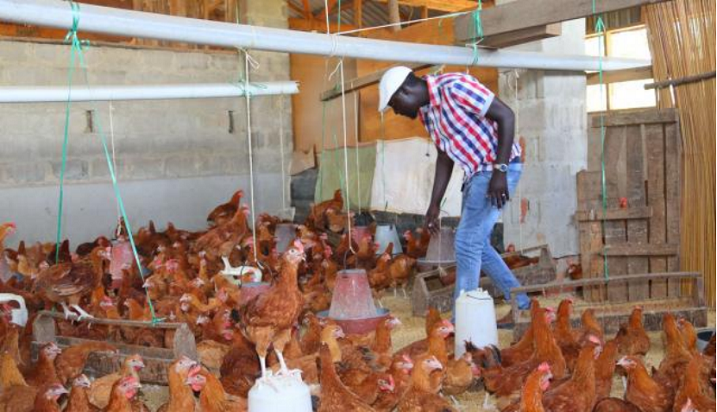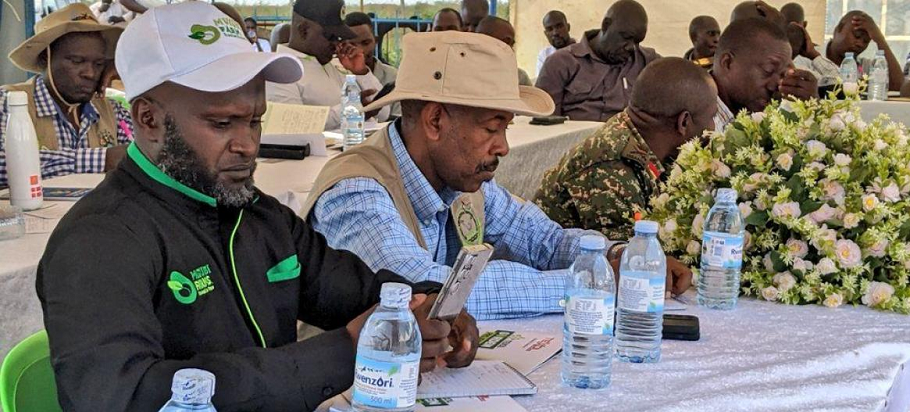Geoffrey Ocakacon checks on some of the Sasso bird breeds at his poultry farm in Unyama B village in Gulu City.
When Geoffrey Ocakacon foresaw minimal chances of his contract being renewed by his employer in December 2020, he knew it was time to prepare early for life away from gainful employment.
Until the outbreak of the coronavirus disease (COVID-19) in the country in March last year, the 37-year-old political scientist worked as an operations manager with an international Non-governmental organization in Kampala.
When the government instituted the first lockdown in March last year to contain the spread of COVID-19, Ocakacon like many other Ugandans found himself being advised to work from home. He later chose to relocate to Gulu city where his family lives but was uncertain about his job.
In December, after nine months of working from home, Ocakacon got the unpleasant news that his contract hadn’t been renewed as the organization downsized staff due to COVID-19 effects. To Ocakacon, although the news was devastating, it didn’t come as a surprise since he had prepared early for it.
A few weeks after relocating to Gulu city in March 2020 to work from home at the peak of the COVID-19 pandemic, Ocakacon teamed up with a colleague to explore a venture that would sustain him in any case things didn’t go well at work.
Ocakacon says that they zeroed on hybrid poultry farming using the free-range system since their analysis showed a potential market for organic birds. They were also eyeing booming business once the economy is reopened.
With two and a half acres of land available in Unyama B village in Pece Laroo Division, Gulu City, Ocakacon, says that they sunk Shillings 85million, part of his savings into the poultry project. He notes that the money went into the construction of a 23 by 10 meters’ chicken house, fencing, chicken feeds, solar lighting, and the needed equipment for poultry.
In July, he purchased his first stock of 400 French Sasso birds from Kamwenge District and another 100 Kuroiler birds. A month later, he added another 200 Sasso birds from Wandegeya in Kampala. According to Ocakacon, despite Sasso birds being slow growers, the birds are resistant to diseases making them suitable for business.
To boost the birds’ growth, Ocakacon says they ensured that they get quality concentrates, soya, and maize brands, which were at the time are very cheap. He would also later diversify the business by adding in Kenbro chicken, a dual breed for both meat and eggs imported from Kenya.
Turning point
According to Ocakacon, towards Christmas last year, the business flourished due to the ready market for both the birds and eggs. For instance, he says every week, he would sell about 100 birds between Shillings 30,000 and 40,000 each depending on their weight.
He also notes that weekly they would harvest 52 trays of fertilized Kenbro bird eggs that were in high demand from the local population. Each tray of fertilized eggs, according to Ocakacon fetches Shillings 22,000.
Ocakacon says his clients were mostly those involved in catering services and people within the community who appreciate organic birds kept under a free-range system. He however notes that the second wave of the COVID-19 lockdown greatly impacted the growth of their business.
Ocakacon notes that they are stuck with close to 250 birds for close to six months since buyers can’t afford their rates. He says the problem has also been compounded by the high cost of chicken feeds, continued restrictions on the numbers of people attending weddings and parties among others.
For instance, a kilogram of maize brand which used to go for Shillings 500 has risen to Shillings 1,100 while soya beans brand now cost Shillings 3,000 from Shillings 700 a kilogram. The birds consume up to 100 kilograms of feed every day.
Ocakacon says although the return has been low, he doesn’t regret having ventured into the business, adding that he has learned valuable lessons of being resilient.
Currently, Ocakacon has over 2,000 birds on his farm. He says 900 of the Sasso birds are waiting for the December festive season market. He also employs two permanent workers at his farms with a number of people on a contract basis for casual works.
The 37-year-old political scientist is however optimistic that business will thrive once the economy is fully reopened next year. For now, Ocakacon says he has downsized the operation and will only be raising birds depending on the season while maintaining a sizeable number of walk-in clients.
What clients say about Ocakacon’s business
Dr. Tony Kidega, the Managing Director of Gulu Country Dairy Farm, says that he purchases eggs and chicken on a weekly basis from Ocakacon’s farm because of their production standards.
He says Ocakacon’s poultry is organic and makes it healthier to consume since they are raised under free range. Acheng Lilian, an accountant at Pearl Afrique Hotel in Gulu city, says that they started doing business with Ocakacon in early November.
He has since become the supplier of Kuroiler chicken at the hotel.






Keep winning my brother